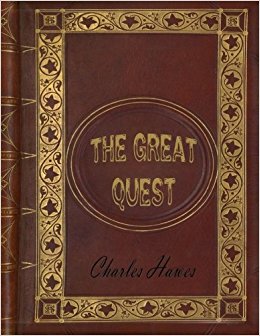
HOME SCHOOL BOOK REVIEW
Book: The Great Quest
Author: Charles Hawes
Illustrator: George Varian
Publisher: CreateSpace Independent Publishing Platform, republished 2016
ISBN-13: 978-1530154401
ISBN-10: 1530154405
Language level: 3 (barely)
(1=nothing objectionable; 2=common euphemisms and/or childish slang terms; 3=some cursing and/or profanity; 4=a lot of cursing and/or profanity; 5=obscenity and/or vulgarity)
Recommended reading level: Ages 14-18
Rating: ***** 5 stars (EXCELLENT)
Reviewed by Wayne S. Walker
Disclosure: Many publishers and/or authors provide free copies of their books in exchange for an honest review without requiring a positive opinion. Any books donated to Home School Book Review for review purposes are in turn donated to a library. No other compensation has been received for the reviews posted on Home School Book Review.
For more information e-mail homeschoolbookreview@gmail.com
Hawes, Charles. The Great Quest (published in 1921 by The Atlantic Monthly Press; republished in 2016 by CreateSpace Independent Publishing Platform). It is 1826, and Josiah (Joe) Woods is an orphan whose age is never given. One reviewer says about seventeen, but Joe himself, who narrates the story, implies that it is around twenty. He lives in Topham, MA, with his late mother’s only brother, Uncle Seth Upham, a wealthy storekeeper. His best friends are Upham’s two clerks, Simeon (Sim) Muzzy and Arnold Lament, both young men but older than Joe. One day an old friend of Seth’s, Cornelius “Neil” Gleazen, known formerly as a man of bad reputation who had left decades prior under very unfavorable circumstances, unexpectedly returns to town. Gleazen begins to exert an odd control over Mr. Upham, eventually convincing him to sell all of his assets, including store, property, and land, and invest in a ship, claiming to be have a fabulous treasure that he had left on the African coast which will make all involved very rich. So Neil, Seth, Joe, Arnold, Sim, and farmer Abraham (Abe) Guptil, on whose mortgage Neal forced Seth to foreclose in order to raise money to outfit the expedition, all set sail on the brig Adventure, captained by Gideon North, along with second mate Mr. Severance and ship’s boy Willie McDougald, among others.
They stop in Havana, Cuba, where they take on a couple friends of Gleazen’s of questionable character, a hulking first mate named Molly Matterson and a sleazy seaman named Pedro who has a parrot. Joe and Arnold begin to suspect that the trip might have something to do with the slave trade, but they have no proof. So they sail to the coast of Guinea where they become involved in a widespread tribal war, suffer through the insanity and death of Seth Upham, witness the killing of an English missionary, rescue the missionary’s daughter who is accompanied by a native African servant, and experience a shipwreck. What was the real purpose for the trip? Will they ever make it home? And what finally happens to them? There is a little bit of bad language. In addition to a couple of common euphemisms (confounded, blasted), various forms of the “d” word, including the phrase “tinker’s ‘d,’” are used a few times and attacking natives are called “sons of ‘h….’” References smoking tobacco and drinking alcohol also occur, but otherwise nothing objectionable is found. The Great Quest (1921) was a 1922 Newbery Honor book. In addition, author Charles Boardman Hawes (1889 – 1923) was posthumously awarded the 1924 Newbery Medal for The Dark Frigate (1923).
A female reviewer wrote that when the ship arrives in Africa “the book begins to decline in quality at this point,” concluding, “Excellent first half, horrible second half. Such a pity.” I guess that I might expect a girl to say that. But this is a boy’s book. I suspect that every author of boys’ adventure stories hopes that his will be the next Treasure Island, of which Nathanael Bluedorn wrote, “If you look up the word ‘adventure’ you will find listed in the dictionary as its definition, ‘circumstances following the plot of Treasure Island.’” I would say that The Great Quest is not far behind. Another reviewer, also a female, said that it is the book which she thinks should have won the Newbery Medal in 1922. Actually, I would have chosen Cedric the Forester for the medal myself, but The Great Quest would have been a close second—anything besides Hendrik Willem van Loon’s pedantic volume The Story of Mankind. Furthermore, The Great Quest gives a good historical picture of the horrors associated with the African slave trade. The book is definitely not politically correct, but in spite of its flaws, I give it five stars. Unfortunately, the CreateSpace edition which I read does not have George Varian’s illustrations and is absolutely riddled with typographical errors due to scanning and lack of proofreading. This is another reason why I do not recommend CreateSpace reprints.
